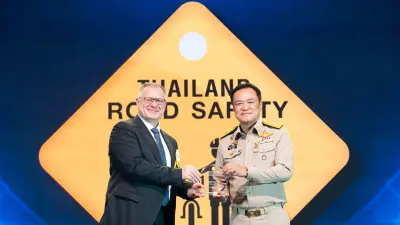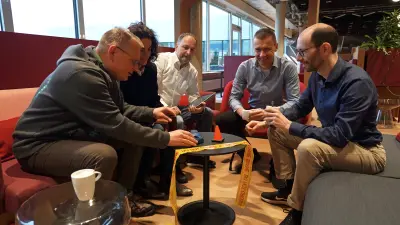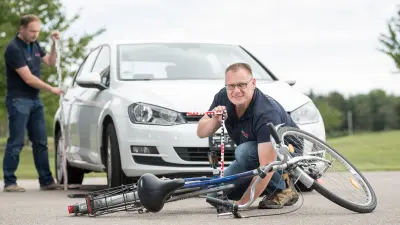Working together for greater road safety
How Bosch accident research aims to make Thailand’s roads safer
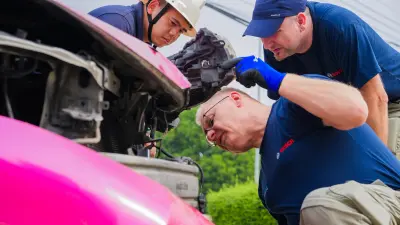
Bent over the crumpled hood of a pink taxi, Thomas Lich wipes the sweat from his brow. The taxi is parked outside a police precinct in Nonthaburi, a suburb of the Thai capital city Bangkok. A broken headlight dangles from the right-hand side of the vehicle. Its fender is completely dented. Even in the mornings, it is very hot and humid in Thailand. Lich thoroughly examines the heavy damage. Normally, he works for Bosch Research in an air-conditioned office in Renningen, Germany, where he heads up the company’s accident research department. But today, as he examines the damaged vehicle, his every move is being watched by roughly twenty Thai students, police officers, and forensic scientists.
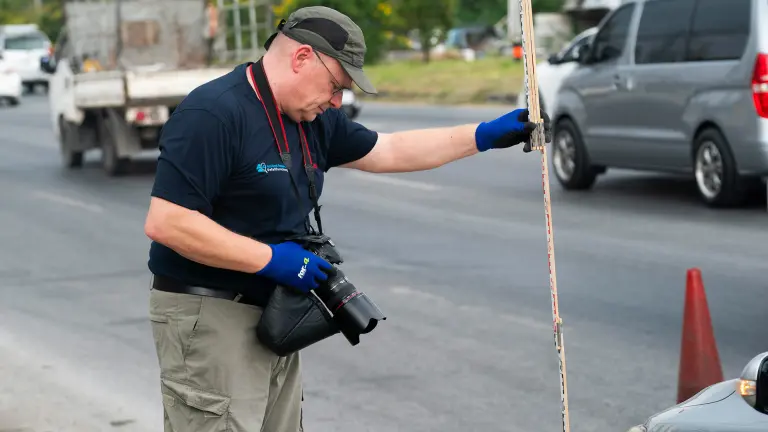
Loading the video requires your consent. If you agree by clicking on the Play icon, the video will load and data will be transmitted to Google as well as information will be accessed and stored by Google on your device. Google may be able to link these data or information with existing data.
Accidents, human tragedy, statistics: the unhappy reality of Thailand’s roads
The day before, the taxi had been involved in a severe traffic accident in the immediate neighborhood. To establish what caused the accident, it has been brought to the police precinct. Together with his colleague Jörg Mönnich and the fact-finding group, Lich wants to find out what exactly happened. He explains that it must have been a sideways-on collision with a motorcycle, and points out the telltale signs on the taxi’s bodywork. But the question of who is to blame isn’t the main concern of his tutorial. That is for the police and the courts to decide. What Bosch wants to do is help set up a collaborative accident database in Thailand. Its task will be to scientifically gather data about fatal traffic accidents and then evaluate them statistically. In Germany, the model for this, with a comparable database, has been in active operation for 25 years now. Its name is GIDAS, or German In-Depth Accident Study. One of its uses is to establish statistically what factors lead most frequently to road accidents. The German accident database comprises more than 47,000 road accidents involving personal injury. With roughly 2,000 accidents per year, each broken down into more than 3,500 individual items of information, this exhaustive database is the foundation for detailed analyses and insights.
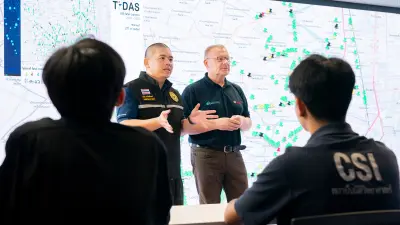
In Thailand, knowledge about the causes of road accidents is still patchy. Together with the CIFS, the country’s Central Institute of Forensic Science, Thomas Lich wants to change this. In these efforts, he works very closely with Kanik Chalermphak. Kanik is an accident expert and forensic scientist at the CIFS. Such accident experts are always summoned by the police when an accident is fatal, with the victim dying at the accident scene. Regrettably, this happens far too often. Practically 24/7, they are called out onto Bangkok’s roads to investigate, and record accidents. It’s no easy job, since terrible human tragedy is always involved. At the accident scene, the CIFS experts take photographs and measurements, and examine the vehicles involved. In Thailand, more than 800,000 people were injured in road accidents in 2023. Of them, more than 14,000 lost their lives. In terms of its total population, this makes the southeast Asian country one of the most dangerous places in the world to drive.
Getting to the root of the problem
But why is that? Kanik sees a number of reasons. Some of them are immediately obvious. At road junctions, the many motorbikes and scooters weave their way through the cars to the front. And if they think it’s too far to go before they can change direction, many bikers and cyclists ride against the flow of traffic. In the midst of all this, tuk-tuks and trucks — fully laden and sometimes in a poor state of repair. On the roadsides, the typical mobile food stalls frequently block the line of sight. There are scarcely any safe pedestrian crossings. On top of that, many road users pay scant attention to potential dangers, riding without helmets and driving without seatbelts. “The infrastructure is often a big problem. It’s sometimes difficult to see which road to follow, and road lighting is poor,” Lich says. And, he continues, the state of the vehicles is often substandard, and too many of them are not fitted with modern safety systems. “One thing our studies have shown is that trucks are frequently not fitted with underride guards,” Lich adds. The CIFS’s Kanik underscores how important the project is: “We want to make our roads safer. We asked Bosch to give us the benefit of its proven expertise.” As the world’s biggest automotive supplier, Bosch not only has in-depth technical expertise, but also its own accident research department, with 20 years of experience. Lich’s team has already successfully set up similar projects around the world, and gathered experience of regional challenges. Barely any other automotive supplier can offer a comparable level of expertise. On this basis, Bosch and its partners can work together to identify causes and develop and prioritize effective measures. The long-term aim is to create a universally accessible database for Thailand — one that will provide the basis for the meaningful studies that decision makers need in order to identify what action to take. After all, lawmakers, road operators, authorities, and automakers cannot do everything at once – and Thailand is no exception.
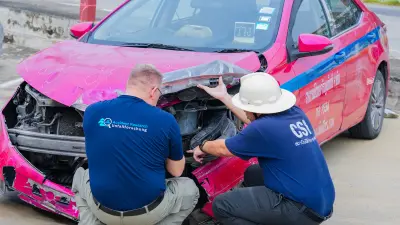
Hard facts — scientific accident data
When it was set up in 2018, the Bosch and CIFS project was only able to draw on patchy data. From this basis, it aims to establish the TIDAS (Thailand In-Depth Accident Science) database. Working to scientific standards and following the German model, the database is initially intended to include fatal accidents in Nonthaburi province. The CIFS currently records up to 300 items of information per accident. These will then be gradually complemented with further region-specific items, allowing researchers to identify causes and pinpoint triggering factors. “But as a basis for road safety measures, this isn’t enough. We need a lot more cases,” Lich says. “That’s why we first of all have to record, reconstruct, analyze, and examine more accidents.” Bosch assists the CIFS with expertise, and gives answers to important questions: What photos and what measurements need to be taken at the accident scene? What was happening prior to the collision? What needs to be documented on the spot — even in situations in which traffic needs to be kept moving? And what can be analyzed later, in the peace and quiet of the office? The partnership is currently planned to last until 2026. Initial findings and analyses from the project are promising. The data highlight regional accident blackspots on certain roads and at certain junctions. This allows road operators to pinpoint where a pedestrian crossing should be built, or the course of a road modified.
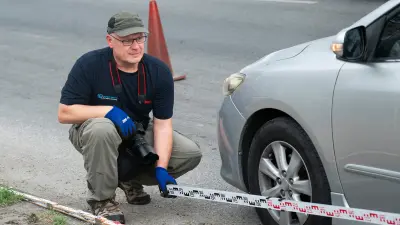
Fewer accidents thanks to Bosch safety systems
Apart from infrastructural problems, vehicles also lack certain technical features. Lich stresses how important these are: “Advanced safety technology could prevent very many accidents in Thailand as well, especially those involving motorbikes.” Motorized two-wheelers are frequently the preferred way of getting around in Thailand. In fact, the country has the highest motorcycle density in Asia. The downside is that 80 percent of all traffic fatalities in Thailand are motorbike or scooter riders. This makes safety systems for two-wheelers especially crucial. However, they feature too rarely in the country. But this is set to change. Since January 2024, the Thai government has made it a legal requirement for all motorcycles with more than 125 cc to be fitted with an ABS. For Thomas Lich, this could not come soon enough: “Our studies suggest that one in three motorcycle accidents involving personal injury can be avoided or mitigated – provided all motorized two-wheelers are equipped with ABS.” This system is also advisable for smaller motorcycles and scooters. Many years ago, Bosch accident researchers were able to demonstrate the benefits of motorcycle ABS and a vehicle dynamics control system for motorcycles. In 2013, Bosch debuted its MSC motorcycle stability control, which improves riding safety. “This was an example of how we accident researchers can provide an impulse for development work,” Lich says.
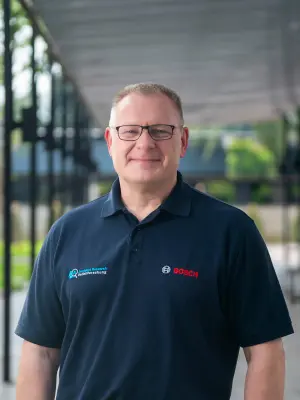
Our studies suggest that one in three motorcycle accidents involving personal injury can be avoided or mitigated — provided all motorized two-wheelers are equipped with ABS.
There is another problem in Thailand: fully laden, if not overladen, pickup trucks — most of them without any ESP® electronic stability program. Because their center of gravity is so high, they have a tendency to skid or roll over. In the case of Europe, Bosch accident research was able to use its data to prove scientifically how effective ESP® is. In cars, this anti-skid system can prevent 80 percent of all skidding accidents. In the EU and U.K. alone, ESP® has saved more than 22,000 lives over the past 30 years.
And when it comes to vehicle safety, Bosch has no plans to stop innovating. The use of its innovative ARAS advanced radar-assisted systems could prevent one in six motorcycle accidents. Bosch researchers and engineers are united by one clear, ambitious goal: virtually accident-free mobility — and this worldwide.
Commended partnership – hand in hand for Thailand
The Bosch accident research team and their partners from the CIFS are playing an important part in this. For this commitment in Thailand, Bosch was presented with the Thailand prime minister’s prestigious Road Safety Award in 2024. The scientific work done by Bosch accident researchers shows how many steps — large and small — are needed together with partners across the globe to make mobility safer and prevent accidents. In the tropical heat of Thailand, it’s a goal that’s worth every bead of sweat.
